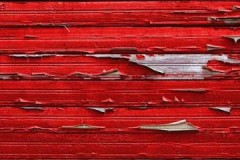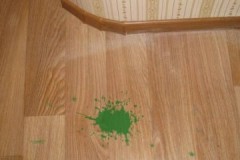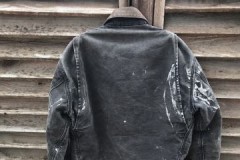An overview of methods and means, how you can effectively wash acrylic paint
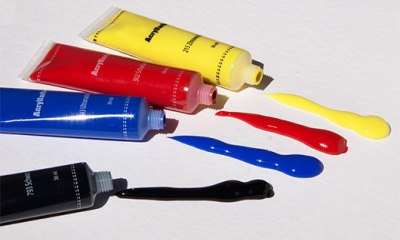 Acrylic paint contains polymers called polyacrylates. It is a water-dispersed substance that, after drying, forms a dense film.
Acrylic paint contains polymers called polyacrylates. It is a water-dispersed substance that, after drying, forms a dense film.
In this regard, it is difficult to clean any surfaces from such a coloring matter. It is recommended to do this before the stain dries.
It is recommended to deal with old marks with solvents. There are nuances of removing acrylic paints from various surfaces.
In this article we will tell you how and with what to wash acrylic paint from various surfaces.
Content
How to remove fresh tracks?
So how do you clean your acrylic paint? It is recommended to wipe off the stain from the dye as soon as possible. To prevent the paint from hardening quickly, the surface should be treated with cold water.
Then you need to use the following tools at hand:
-
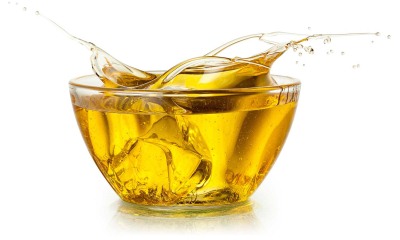 Sunflower oil with soap... It is necessary to moisten the dirt abundantly with oil and leave for 20 minutes.
Sunflower oil with soap... It is necessary to moisten the dirt abundantly with oil and leave for 20 minutes.After that, it is necessary to brush the surface with a previously prepared warm soapy solution. After cleaning, rinse the product with clean water.
- Isopropyl alcohol... After treating the surface with cold water, generously moisten the stain on it with isopropanol. It is necessary to wait about 5-10 minutes, then wipe off the trace with a stiff brush. After cleaning, you need to wash the product with water.
- Window cleaner... After processing the product with cold water, it is necessary to sprinkle it with a generous amount of window cleaner. You need to wait about 5 minutes, then use a stiff brush to erase the stain from the dye. After processing, the surface is thoroughly washed with warm water and soap.
Contamination must be wiped off with a sponge. If necessary, you can rub it with a brush.
How to clean stubborn stains?
Already stubborn stains can be fought with baking soda or vinegar.... More effective solvents, including acetone, turpentine. You can also use kerosene.
Soda
Soda is a good cleaning agent. The substance is safe for humans.
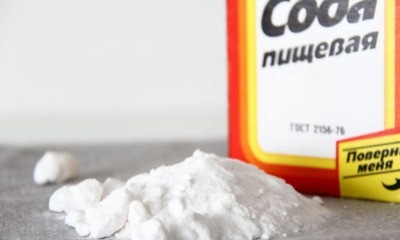 For cleaning products from acrylic paint you must use soda powder:
For cleaning products from acrylic paint you must use soda powder:
- generously sprinkle them with a trace of the dye;
- soak the sponge with water;
- intensively start rubbing soda into the dirt, to enhance the effect, use a stiff brush;
- wash off the soda from the surface with warm water.
The combination of soda powder, dish soap and lemon juice will make it easier to remove stubborn acrylic stains from items.
How to erase with vinegar?
The composition of this product contains acetic acid - this is a good solvent... It is necessary to pre-rinse the surface with cold water, and then soak the dirt on it with vinegar. You can warm up the solution a little.
Acetone
This substance is used to dissolve dyes and varnishes.... It is recommended to use pure acetone to remove acrylics from various surfaces, rather than the one found in nail polish removers.
It is necessary to thoroughly saturate the paint stain on the product. Then you need to wait 5 minutes for the acetone to begin to dissolve the old paint. Wipe off dirt with a sponge. You can use a brush.
How to remove pollution with turpentine?
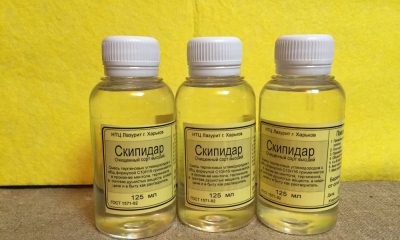 This substance dissolves well not only dyes, but also varnishes. You can wash off old paint with turpentine.
This substance dissolves well not only dyes, but also varnishes. You can wash off old paint with turpentine.
It is necessary to moisten the acrylic stain on the product with it, let the solvent soak well into it... After that, with a sponge or brush, you need to carefully rub the turpentine into the dirt.
After processing, the surface should be rinsed with water. Turpentine must be kept away from sources of ignition.
Kerosene
This hydrocarbon mixture can be used as a solvent for dyes... Kerosene is good at eating away old traces of acrylic.
If the stain is stubborn, a stiff brush should be used. After processing, thoroughly rinse the surface with warm soapy water and then clean water.
Special solvents
Both aerosol and combination products are suitable for removing marks on various products. Solvents are the best option. But when choosing and applying them, one condition must be taken into account.
Such products are distinguished by a pungent odor, they adversely affect the condition of the skin.... Therefore, it is necessary to work with them only with gloves and a respirator.
Solvents can attack some types of products. This is especially true for fabrics and wallpapers. It is recommended to select natural rather than chemical solvents for such products.
Video review of acrylic paint remover:
Top 3 best
Most often, there are 3 such effective means for purifying water from acrylic paint.
WD-40
One of the best products for removing acrylic from various surfaces is WD-40 spray. It is a versatile remedy. Its basic component is white spirit, which is considered the best solvent for dyes.
WD-40 should be used as follows:
- With a spatula or scraper, remove some of the paint from the product.
- Spray the dye trail.
- Wait at least 20 minutes.
- Rub the stain with a sponge.
- Scrape off the remaining dirt with a scraper.
- Wash the product with warm water and soapy water.
WD-40 is best suited for wiping acrylic paint off plastic, metal, wood and rubber. The price of 100 ml of aerosol is 180-240 rubles.
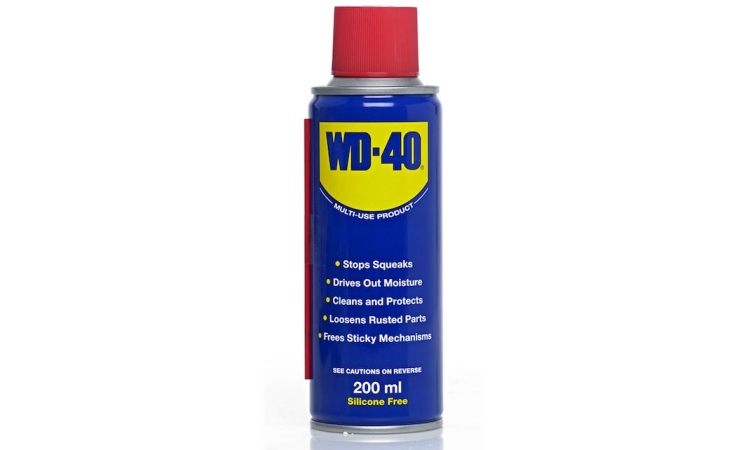
Denatured alcohol
One of the best remedies is denatured alcohol. It is a three-component substance. It contains three solvents.This is kerosene, as well as methanol with ethanol. 500 ml of denatured alcohol cost about 250 rubles.
The product should be used according to the following scheme:
- Liberally moisten the stain with liquid.
- Wait about 5-10 minutes.
- Wipe off dirt on the product with a sponge.
- Wash the surface with warm water.
Denatured alcohol is poisonous... When working with the product, it is required to wear not only gloves, but also a respirator. Do not keep denatured alcohol near fire.
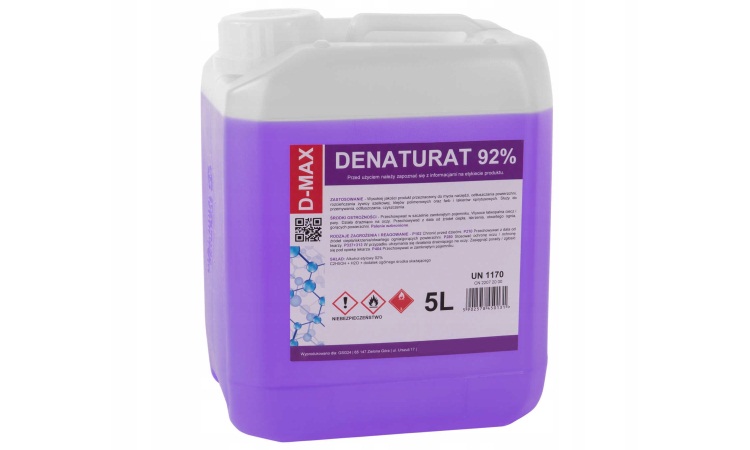
White Spirit
The third in the list of the best products for cleaning acrylic from products is white spirit. This is solvent gasoline. The product dissolves well oil and acrylic paints, as well as enamels with varnishes. The price of 1 liter of white spirit is 100-110 rubles.
You can remove the coloring matter from the product according to the scheme:
- Sponge with white spirit on dirt.
- Wait 10 to 15 minutes.
- Wipe the stain with a foam sponge.
- Wash the surface with warm water.
Work with white spirit only in a well-ventilated area. Keep the product away from sources of ignition. Surface treatment with white spirit should be carried out only with gloves and a respirator.
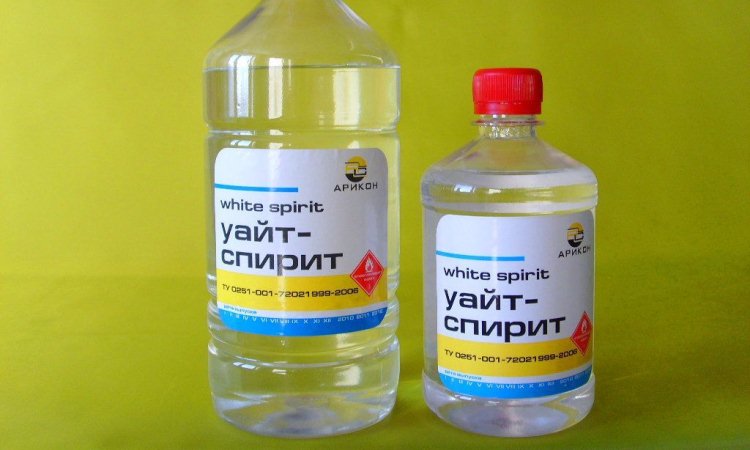
How to remove from the ceiling, plastic, fabric and other surfaces?
For a specific type of surface, a specific agent for removing stains from stains is suitable.
| Surface type | Suitable product with short instructions |
| Plastic | It is recommended to remove dirt with WD-40 aerosol. The plastic should be wiped with a soft sponge treated with this product. Hard brushes can damage the plastic. |
| the cloth | Thick fabrics can be cleaned with white spirit, turpentine, vinegar or kerosene. Delicate fabrics should not be stained with solvents. It is better to limit yourself to a soap and soda solution. After processing the fabric, wash it thoroughly. |
| Hand skin | The skin is sensitive to solvents. To remove traces of acrylic from the skin of your hands, use alcohol, scrubs, soda with dishwashing liquid, vinegar, hydrogen peroxide. After treatment, it is necessary to wash the skin with warm water and soap and then treat it with a moisturizer. |
| Ceiling | Washed off acrylic paint with a mixture based on dishwashing liquid and soap solution. Hydrogen peroxide can be used. It is necessary to handle the ceiling with a soft cloth. |
| Linoleum | Any solvent is suitable for cleaning. Spatulas and scrapers can be used to clean the surface. |
| Tile | Any solvents can be used to clean the surface from dyes. When cleaning, scrapers, spatulas, knives are used. |
| Glass | It is recommended to choose white spirit for processing. Knives with sharp blades can be used to scrape off dirt. |
| Wallpaper | Chemicals are not suitable for cleaning the surface. Natural solvents should be chosen. You can use dish detergents, soap. Use soft sponges when cleaning. Do not clean the wallpaper with scrapers, hard brushes. |
Common mistakes when cleaning products
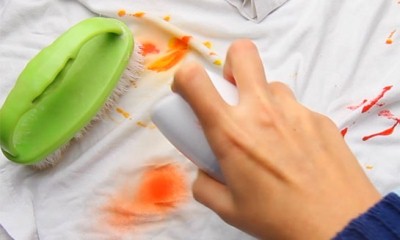 Some people often rub the spot where the stain has arisen when removing dyes from their clothes. Heavy rubbing deteriorates the materiali and wears out prematurely.
Some people often rub the spot where the stain has arisen when removing dyes from their clothes. Heavy rubbing deteriorates the materiali and wears out prematurely.
Such a mistake is fraught with a deterioration in the color of the clothes and a complete loss of its qualities.
Often, when cleaning any products, circular movements are made.... Do not rub the dirt from the center to its edges. Movements need to be done only back and forth.
This cleaning error will increase the size of the acrylic stain on the product.
A common mistake is processing the product with boiling water... Before removing the coloring matter, the surface should be moistened not with hot, but with cold water. Boiling water can cause the product to lose its shape. This is especially true for clothing and wallpaper.
A common mistake is removing stains with solvents from sensitive surfaces without first checking their effect. After using chemicals, clothes, wallpaper can be permanently damaged.
Advice
When cleaning various surfaces from coloring agents, the following is recommended:
- always check how the chemical will behave on an inconspicuous area of clothing, wallpaper, ceiling;
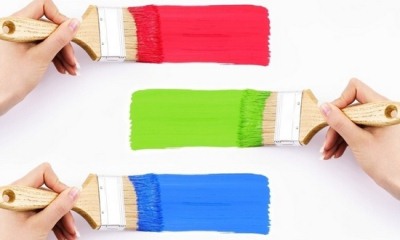 always wear gloves and a respirator when working with solvents;
always wear gloves and a respirator when working with solvents;- when using chemicals, constantly ventilate the room;
- do not use hard scrapers when cleaning plastic, wallpaper, clothing and ceilings;
- when washing hands from acrylic paint, use only natural products and degreasers;
- old stains from acrylic paint must be pre-moistened with cold water before removing;
- to cleanse windows of coloring substances, choose mainly white spirit.
It is important to never pull to remove the dye... It is recommended to do this in the first hour from the moment when the stain was placed on the product. In this case, the contamination must be immediately thoroughly moistened with cold water.
Conclusion
Acrylic paint from various surfaces should be removed immediately and without delay.
Old stains are best wiped off with solvents such as white spirit and denatured alcohol... Also, acetone, turpentine and kerosene have proven themselves. When choosing a product, it is important to consider the type of product that will be processed with it.

